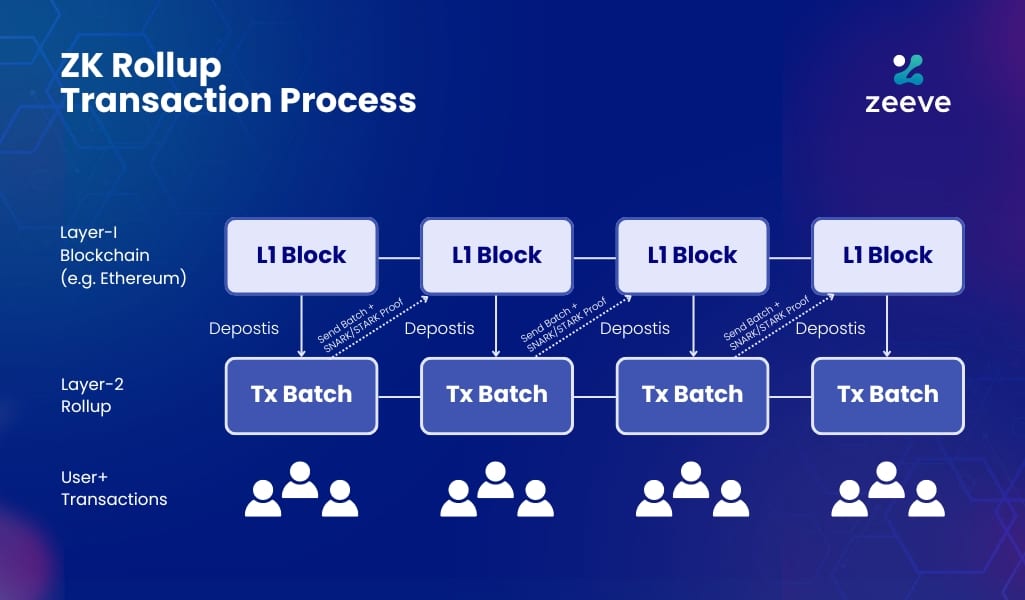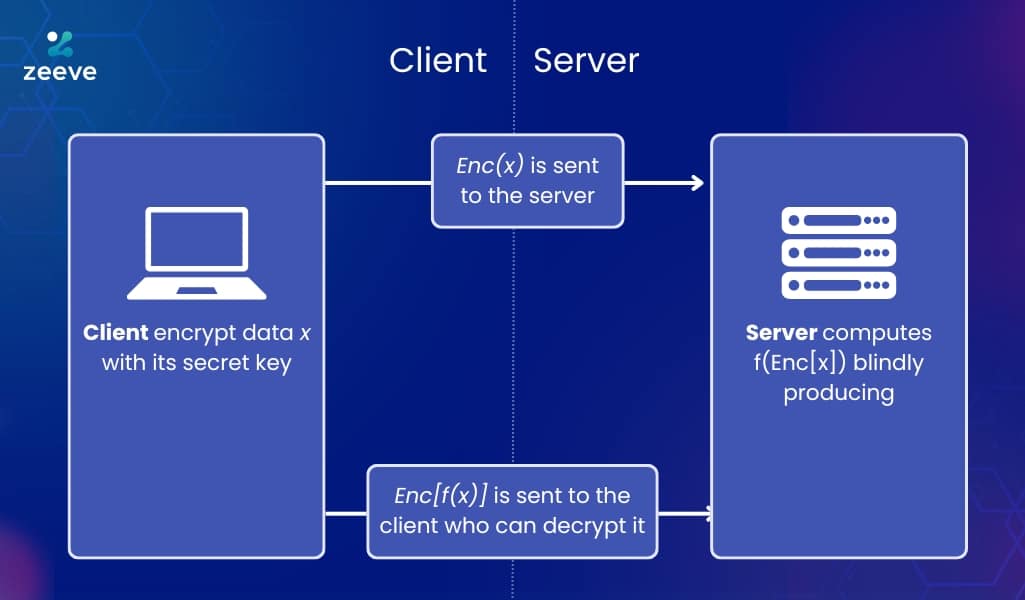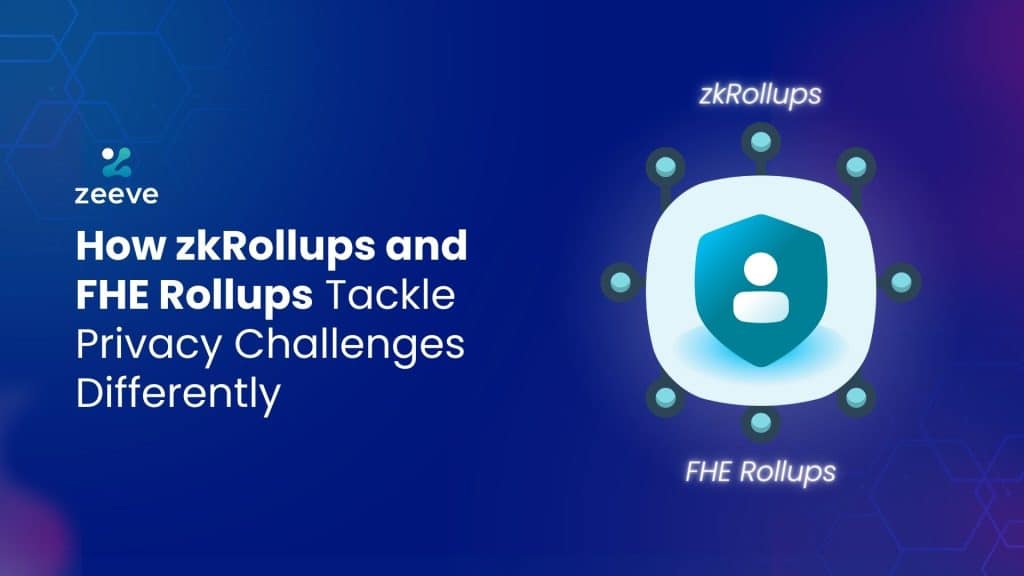One of the most serious challenges Ethereum faces today is privacy. Privacy problems have grown in priority as the number of users and apps on the network has increased. To solve these challenges, zk-rollups and FHE rollups have emerged as some of the most viable options. The article will compare zk-rollups vs. FHE rollups, examining their advantages and applications for improving privacy.
What are ZK Rollups, btw?
To fully comprehend zk-Rollups, one has to have a thorough understanding of zero-knowledge proofs.
A zero-knowledge (ZK) proof is a cryptographic method that enables one person (the prover) to convince another (the verifier) that a particular claim is true without revealing any details about the claim itself.
This is especially helpful in situations where it’s important to verify authenticity or condition compliance without disclosing sensitive information. The name “zero-knowledge” refers to this technique, which allows transaction records to be validated without revealing any further information. Applications for it include private transactions, improving blockchain scalability, and identity verification, as shown by digital wallets and verifiable credentials.
A particular type of layer-two (L2) scaling technique called Zero-Knowledge Rollups (ZK Rollups) emerged to overcome the scalability issues with blockchains like Ethereum. To free up space on the main blockchain, they function by carrying out the majority of transaction processing and computation off-chain.
Subsequently, ZK Rollups adds zero-knowledge proof, a cryptographic validation of these transactions, along with a summary of them for the main chain. This verification confirms the transactions’ legitimacy without necessitating the storage of every detail on the chain. ZK Rollups greatly increase the efficiency of transaction processing overall, which lowers wait times and transaction fees.

zk-Rollups are made up of two essential parts that are necessary for them to function:
- On-chain contracts: On-chain contracts are essential to the zk-rollup protocol by establishing the operating guidelines. The primary contract and the verifier contract are the two main contracts in this segment. The primary contract serves as a rollup block repository, manages deposit monitoring, and enables essential changes. On the other hand, the verification contract has the responsibility of verifying the created Zero-Knowledge Proofs (ZKPs).
- Off-chain virtual machines: These machines, which execute transactions on Layer 2 (L2) outside of the main Ethereum blockchain, are another essential component of the zk-rollup ecosystem. They run independently of the Ethereum network.
What are FHE Rollups?
A key aspect of the design of FHE Rollups is Fully Homomorphic Encryption (FHE), which allows calculations on encrypted data to produce outcomes identical to those on plaintext. Since its inception, Gentry’s concept of FHE has taken several forms. This innovative method permits a wide range of activities, from basic arithmetic to intricate computations, while guaranteeing a high degree of data protection.
A straightforward illustration of FHE would be this: A data owner wants to protect their privacy while still transferring data to a cloud provider for processing. In this case, the data owner transfers the data to the server after encrypting it so that it is no longer readable. Without first decrypting the data to restore its legibility, the server can execute computations on it and return the encrypted results.

Because they have the secret key, only the data owner may decode the results, guaranteeing data security and process confidence.
Fully Homomorphic Encryption Rollups guarantee the confidentiality of all data during transmission, computation, and storage, preventing the ever-present possibility of sensitive data exposure. Because of the incredibly high level of privacy and security offered by continuous encryption, FHE Rollups are especially well-suited for sensitive data-handling applications like financial transactions and medical information.
FHE Rollups provide a scalable method for blockchain integration. They process massive amounts of encrypted data off-chain and guarantee that the outcomes can be safely validated before being reintegrated into the blockchain.
Once the necessary operations have been completed on the encrypted data, the encrypted results must be sent back to the data owner or another designated party for decryption. This technique improves overall efficiency and scalability by lowering the computing load on the blockchain itself while also guaranteeing privacy and security.
Let’s examine how the discussion of zk Rollups vs FHE Rollups is contributing to advancements in privacy solutions.
The Architecture of FHE Rollups
The choice of whether to employ a Zero-Knowledge (ZK) Rollup or an Optimistic Rollup method forms the architectural cornerstone of FHE Rollups. This choice necessitates a careful balancing act between verification efficiency and proof speed.
Preferred for its speed, optimistic rollups presume transactions are valid by default and only do on-chain verification in response to disagreements. Although transaction processing is sped up with this method, any differences must be resolved by a robust fraud-proof mechanism. On the other hand, ZK Rollups provide more privacy by using Zero-Knowledge Proofs to protect transaction data, but at the expense of slower proving times.
An optimistic-based method within the encrypted domain is recommended, taking into account the difficulties of incorporating Fully Homomorphic Encryption (FHE) into the verification process. This approach acknowledges the existing barriers to generating effective ZK-based FHE Rollups while also being in line with FHE’s fundamental properties.
Comparing Privacy Solutions: zk-Rollups vs. FHE Rollups
The origins of Zero Knowledge Proofs (ZKPs) and Fully Homomorphic Encryption (FHE) date back several decades. Although FHE was first proposed in 1978, it wasn’t until 2009 that it became a reality. Conversely, ZK first appeared in the 1980s and served as the basis for a large number of cryptographic systems. Both FHE and ZK have had major improvements over time and are still essential to protecting data privacy.
Data visibility and protection
The transaction data in zk-Rollups is protected from validators by zero-knowledge proofs, although the data isn’t necessarily encrypted. This implies that even though validators cannot view transaction details, there is still a chance for the data to be compromised in the event that the proof system is hacked.
On the other hand, FHE Rollups keep data encrypted throughout. Continuous encryption guarantees that, even in the event of a compromised computing environment, the attacker can only access encrypted data that is useless without the decryption key. As a result, FHE Rollups are better able to safeguard data against leaks and illegal access.
Security
By using cryptographic proofs, zk-Rollups minimize the danger of fraud and data exposure while providing excellent security. By guaranteeing the legitimacy of transactions without disclosing the specifics, a safe transaction environment is created.
But by guaranteeing that data is encrypted during every process, FHE Rollups go above and beyond for security. Ensuring that sensitive data is always safe, this end-to-end encryption guards against data breaches and unwanted access. Because of its strong encryption, in the comparison of zk Rollups vs FHE Rollups, FHE Rollups are especially well-suited for situations where the highest level of data confidentiality is required.
Privacy guarantees and performance
With zk Rollups, high privacy guarantees can be achieved by using ZKPs, which can be computationally demanding to prove but are very efficient in terms of verification. This implies that although the process of verifying transactions is quick and effective, the generation of the proofs themselves may take longer.
FHE Rollups, on the other hand, have a large computational expense but provide strong privacy by encrypting all computations. When compared to plaintext data, operations on encrypted data require more resources to complete. As a result, if we consider zk rollups vs FHE rollups, the latter offers superior privacy despite the fact that they can be slower and need more processing power.
Difference between zk Rollups vs. FHE Rollups
When evaluating zk Rollups vs FHE Rollups, there are a few important things to take into account. zk Rollups are known for their excellent efficiency when it comes to scalability. To do this, they group transactions off-chain and carry out as little on-chain verification as possible, enabling a high transaction throughput. However, because FHE requires more resource-intensive computations, FHE Rollups only provide limited scalability.
Another area where these technologies diverge greatly is in privacy. FHE Rollups offer a moderate level of privacy, making them appropriate for situations where lone users rely on zero-knowledge proofs to keep information private. FHE Rollups, on the other hand, provide a far greater level of privacy. They are perfect for applications that demand strict security measures because they allow complex multi-party calculations on encrypted data.
There are differences in computation difficulty between the two as well. Since zero-knowledge proofs must be generated, zk Rollups are quite challenging but nonetheless rather effective. On the other hand, FHE Rollups have extremely high computational complexity. This is due to the fact that FHE necessitates greater processing power and time due to its extensive computation on encrypted data.
Another factor to consider is the verification time. Quick verification is advantageous for zk Rollups because zero-knowledge proofs are concise. FHE Rollups, on the other hand, have a moderate verification time because it is more difficult to verify the encrypted computations.
Projects using FHE
With the 2020 launch of TFHE and fhEVM, open-source cryptography company Zama elevated FHE ahead in the crypto space. Few projects currently take advantage of the Fully Homomorphic Encryption (FHE) rollups to increase privacy and security within blockchain applications.
Here are some notable ones:
Zama
In early 2020, Hindi and Pascal Paillier, a well-known cryptographer and co-inventor of Fully Homomorphic Encryption (FHE), founded the open-source cryptography startup Zama. The company focuses on creating FHE solutions for applications utilizing blockchain technology and artificial intelligence (AI). Among Zama’s products are the “TFHE-re library,” FHE compiler “Concrete,” “Concrete ML,” and “fhEVM.”
Zama has a three-phase plan for its development approach. The first phase (2022–2024) is dedicated to putting FHE for machine learning into practice, namely to create effective encrypted inference for neural networks. Phase 2 (2025–2027) intends to extend the use of FHE by incorporating analytics, encrypted search, and more extensive privacy-preserving computations. In the end, Phase 3 (2028–2030) aims to attain full FHE capabilities, allowing for practical performance in arbitrary calculations on encrypted data.
Fhenix
Fhenix is driven by fhEVM, a private programming environment, and runs on a layer-2 network that is compatible with EVM. With this configuration, programmers can design apps on the Fhenix platform without needing to have a deep understanding of Fully Homomorphic Encryption. The method provides more comprehensive data protection, especially in cases where data comes from many sources, setting it apart from previous privacy solutions like ZK-SNARKs.
Zama’s fhEVM technology lies at the core of Fhenix’s capabilities. This makes it possible for developers to include FHE in blockchain applications with ease. As a result, blockchain technology has advanced and it is now possible to write encrypted smart contracts in Solidity without having a deep understanding of cryptography.
Fhenix’s first development, the FHE Rollup, enables it to process private and sensitive data on Ethereum in a safe manner, increasing the blockchain’s usefulness for a range of applications.
Their fheOS library contains the essential FHE logic. This is an encrypted computing library that includes pre-compiles for frequently used encrypted opcodes, like addition and multiplication, and comparison of two numbers. It allows network-running Smart Contracts to use FHE primitives inside the contract. This implies that encrypted data can be incorporated into the smart contract logic of dApps that are utilizing or running on Fhenix.
Inco
Inco is a universal confidentiality layer and modular Layer-1 blockchain for Ethereum and other networks that use Ethereum security and fully homomorphic encryption (FHE).
Their fhEVM (FHE + EVM) removes the complexities of FHE and allows Solidity developers to create private dApps in 20 minutes or less by utilizing Solidity, the most popular smart contract language, together with Ethereum ecosystem tools like Metamask, Remix, and Hardhat.
The network provides a programmable and dynamic layer of decentralized identity (DID) that uses FHE to securely store private data on-chain and lets dApps query certain insights.
Final Thoughts
Both zk Rollups and FHE Rollups endorse data privacy, although they function according to different ideas. Since FHE Rollups enable direct computations on encrypted data, data processing can benefit from them. In contrast, Zk Rollups prioritizes demonstrating knowledge of information without divulging it, which makes it perfect for safe transactions and identity authentication.
It is worth considering and conducting more studies to see if it is possible to combine homomorphic encryption with Zk in a single application to provide data security and identity protection and improve the ZKP and FHE algorithms. In the upcoming years, several advances are anticipated that could make data processing and storage even more private and safe.
If you are building a rollup that leverages ZKPs or FHEs or both maybe, and looking for an infra partner, check out Zeeve’s Rollups-as-a-Service (RaaS). If you have any further queries or need consultation, schedule a call with our experts today!





